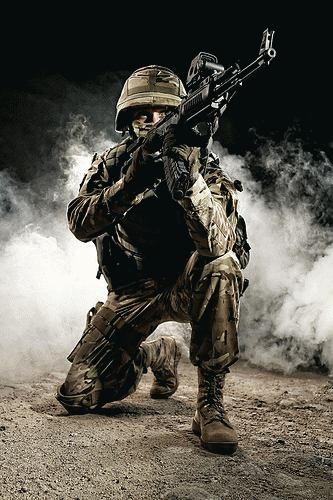Most of the fighting in the long Syrian civil war has been in the eastern and north-central regions. That's where most major cities and supply lines are. There are signs, however, that fighting is shifting to the sparsely-populated, barren east. The US is apparently committing to open-ended operations unrelated to ISIL and unrelated to our national security as well.
Signs of impending operations in the east are clear. The US recently shot down an Iranian drone near Deir Azzour, far from the Kurdish areas and the ISIL capital of Raqqa. American and British special forces increased their numbers near al Tanf on the Syrian-Iraqi border where they are training Syrian Democratic Forces. Satellite images show construction of drone pads in Jordan near the Syrian border and an airfield just inside Syria. A High Mobility Artillery Rocket System (HIMARS) unit deployed into southern Syria last month.
Small ISIL detachments still operate in the region, but these moves are a puzzling allocation of resources away from the Raqqa fight and suggest a bolder plan is unfolding well to the city's south. Eastern Syria is bereft of resources but abundant in geopolitical significance for the sectarian conflict raging in the Middle East. Roadways that stretch through the east connect Iran with allies in western Syria and Lebanon. They are eager if not desperate to keep it open. Saudi Arabia and Israel adamantly oppose this "Shia corridor" and want the US to take action against it.
The Shia corridor can be interdicted by drones and fighter aircraft, routine guerrilla attacks, and by long-range artillery such as HIMARS. These tactics and weapons would make civilian and military convoys between the Shia countries difficult and costly, if not impossible. All these efforts require American troops.
The most effective way to choke off the Shia corridor is the long-term presence of well-supported Sunni forces across eastern Syria. This would be the beginning of a Sunni autonomous statelet there -- Sunnistan, as it sometimes called. Such a statelet would enjoy the support of Saudi Arabia and other Sunni monarchies. It would also require American military support for years or even decades.
Americans show little interest in wars as the casualties are taken by a small, accepting portion of the public. The military, though weary of so many long deployments since 2001, will follow orders. Congress should do more. It's certainly preoccupied with changes to healthcare laws, nominations for key positions, and probes of Russian intrigue. However, events in Syria call for greater investigation and supervision than they have heretofore known, whether under previous or the present administrations.
Congress needs to ask questions. What are the US's plans for eastern Syria? Are we preparing to fight Syrian, Iranian, and perhaps Russian forces for mastery of the region? Do we intend to create a Sunnistan there? If so, will it include disgruntled Sunnis in Iraq and require further redrawing of maps? Naturally, there's no need to discuss an exit strategy as once deployed, American troops will remain indefinitely.
Our wars in Afghanistan and Iraq, it might be noted, have not worked out as planned. Efforts to build a modern economy and government in Afghanistan have failed badly, and seem ridiculous in retrospect. Iraq is so rent by sectarian and ethnic fighting that it's breaking apart. Plans for eastern Syria have the same intellectual provenance as these quagmires, and may not fare any better.
Brian M Downing is a national security analyst who has written for outlets across the political spectrum. He studied at Georgetown University and the University of Chicago, and did post-graduate work at Harvard's Center for International Affairs.





